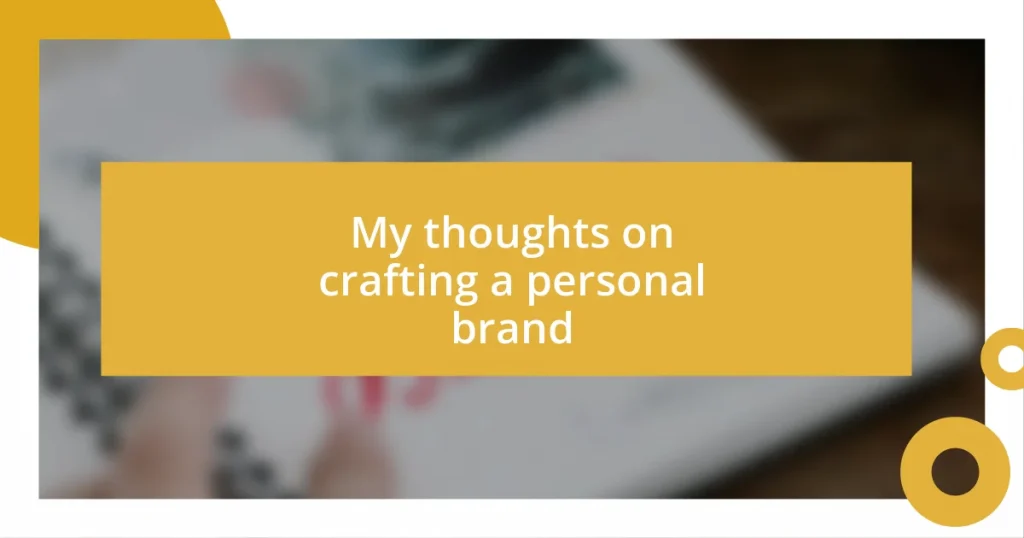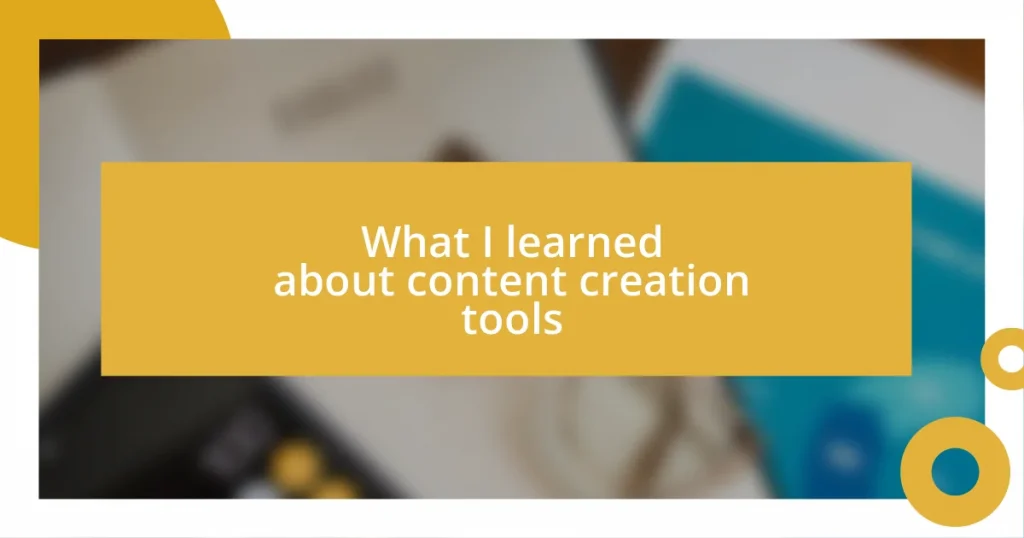Key takeaways:
- Personal branding is about defining unique strengths and values, evolving over time while maintaining authenticity.
- An effective personal brand enhances online presence, builds trust, and fosters meaningful professional relationships.
- Measuring brand impact through feedback and engagement metrics is essential for growth and understanding audience connections.
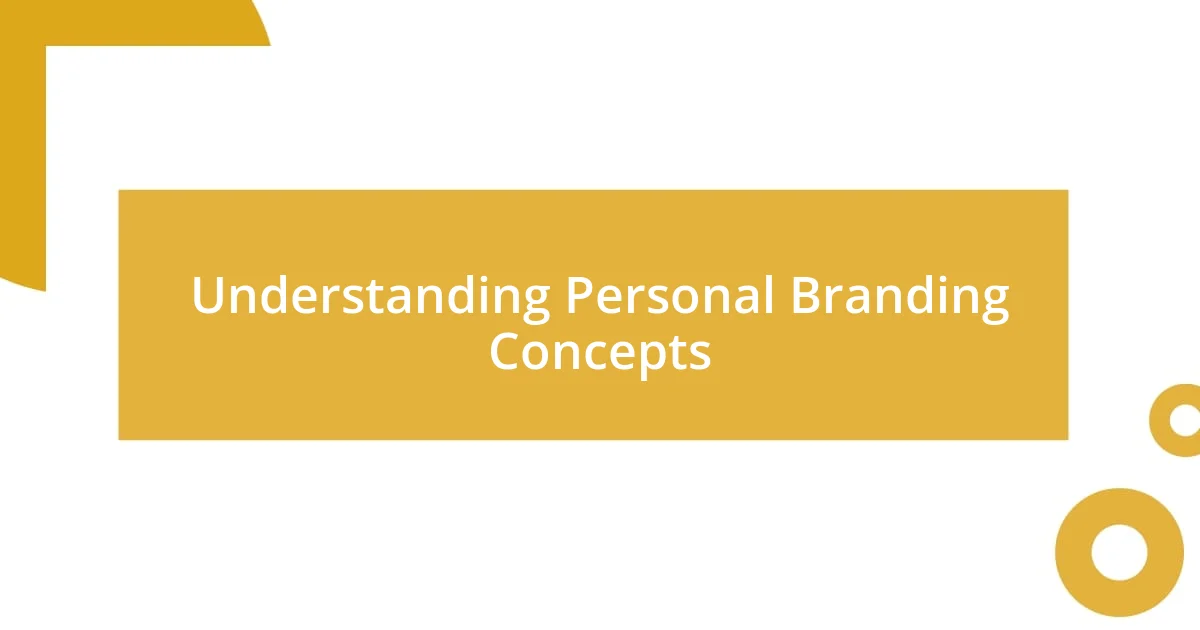
Understanding Personal Branding Concepts
Personal branding is about defining who you are and what you stand for in both your personal and professional life. I remember when I first started focusing on my own brand; it felt daunting. What do I want people to think of when they hear my name? This reflection is crucial because your personal brand isn’t just how you present yourself; it’s how others perceive you.
At its core, personal branding involves identifying your unique strengths and values. I often think about that moment I received feedback on my work—people appreciated my approachability and authenticity. That taught me that personal branding goes beyond skills; it’s about the emotional connection you create with others. How do you want to make others feel?
Moreover, understanding personal branding means realizing that it evolves over time. I’ve changed and grown, and my brand has had to adapt to reflect that evolution. It’s essential to remain authentic while being open to change. Do you embrace that flexibility in your personal brand? It’s not just about setting a static image but crafting a narrative that grows with you.
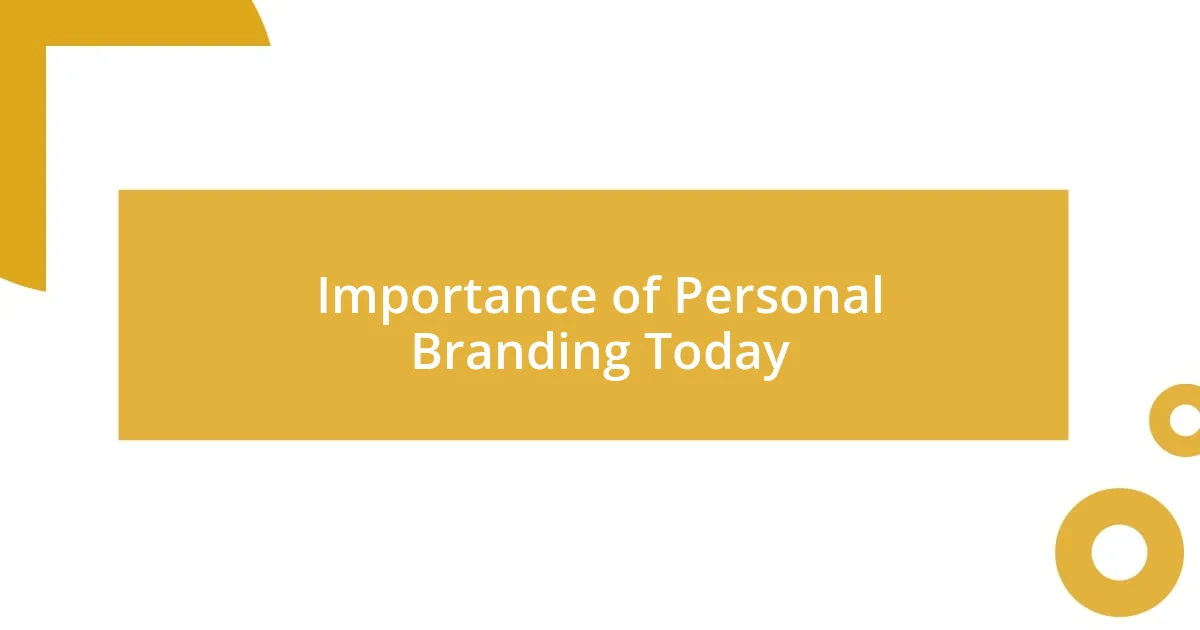
Importance of Personal Branding Today
The significance of personal branding today cannot be overstated. In a world bustling with information, having a distinct personal brand sets you apart from the crowd. I remember a networking event where I met countless professionals—some made a lasting impression on me, while others faded away. Those with a clear personal brand communicated their values effortlessly, making connections based on shared interests and mutual respect.
We live in an age where our online presence often reflects our personal brand. When I started sharing my thoughts on social media, I realized how quickly people could form an opinion about me based solely on my posts. It’s fascinating to see how consistency in messaging strengthens one’s brand. This online visibility can lead to unique opportunities, whether a job offer or collaboration, that might not have come otherwise. What do you think resonates more with potential employers: a generic resume or a vibrant digital persona?
Personal branding also plays a crucial role in building trust and relationships. A few years ago, I faced a challenge where I had to pivot my career. The foundation I had laid through my personal brand allowed me to lean on my connections and gain support. It’s incredible how a well-constructed personal brand opens doors and fosters a network that’s both supportive and valuable.
| Factor | Impact of Personal Branding |
|---|---|
| Distinction | Helps you stand out in competitive environments. |
| Online Presence | Shapes how potential employers and peers perceive you. |
| Trust Building | Fosters deeper connections and enhances professional relationships. |
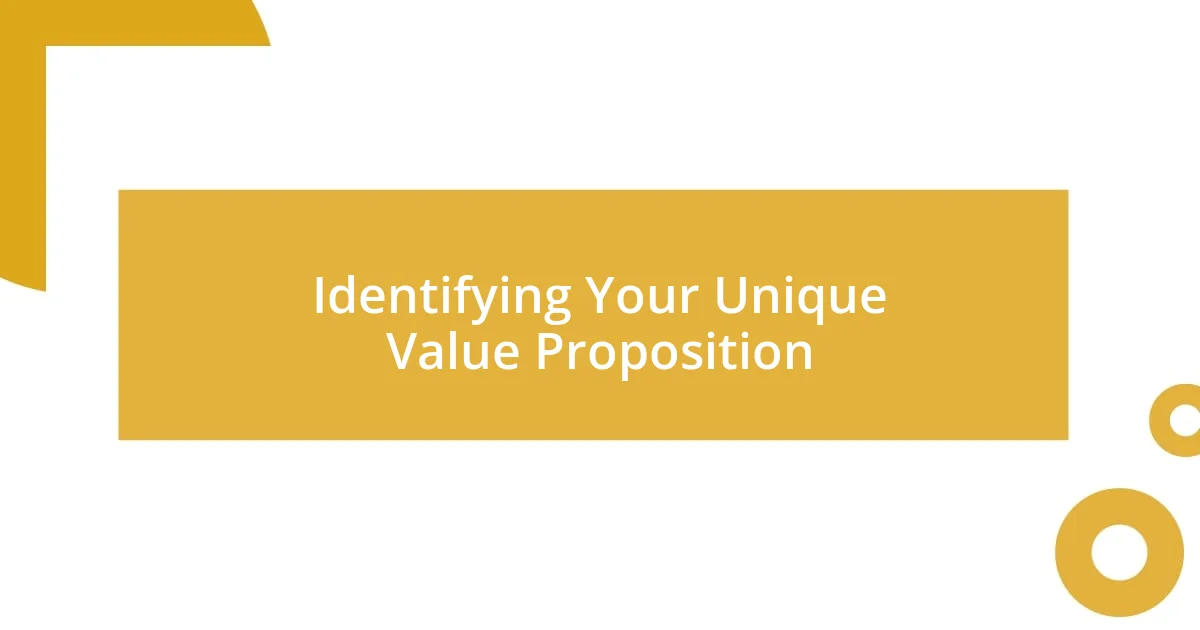
Identifying Your Unique Value Proposition
Identifying your unique value proposition (UVP) is a crucial step in establishing a personal brand that stands out. It’s essential to dig deep and determine what sets you apart from others in your field. I recall a time when I participated in a workshop aimed at helping individuals articulate their UVP. The exercise of highlighting my distinct skills and experiences was eye-opening. I discovered that my blend of creativity and analytical thinking truly makes me unique.
To help you identify your UVP, consider these aspects:
- Strengths: What are the skills you excel at that others might struggle with?
- Passions: What topics or activities light a fire in you?
- Experiences: What past experiences have shaped your perspective and approach?
- Values: What values drive your decisions and everyday actions?
- Feedback: What do friends and colleagues say about your unique approach or contributions?
Reflecting on these elements can lead to a clearer understanding of your unique offering. When I leaned into my UVP, I found it not only guided my career choices, but also influenced how I connect with others. It’s liberating to have that clarity; it has transformed my professional interactions significantly.
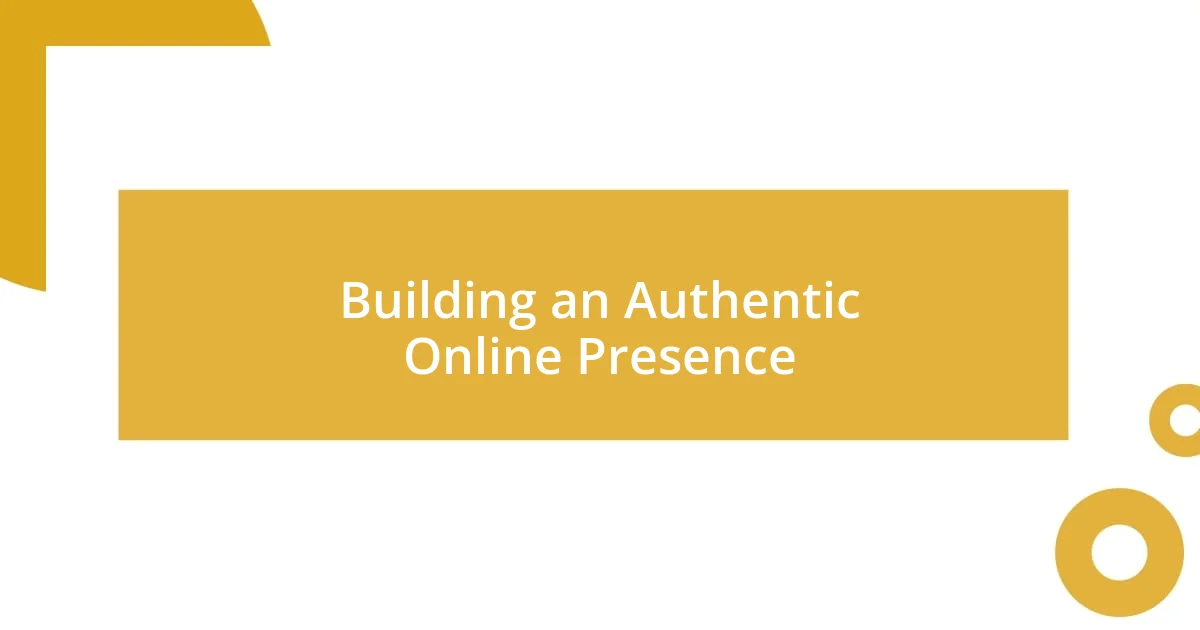
Building an Authentic Online Presence
Building an authentic online presence is all about transparency and genuineness. I recall a time when I decided to post about my failures alongside my successes on social media. The response was overwhelming; people appreciated the honesty. It made me realize that vulnerability can strengthen connections. What if we all shared our real journeys—wouldn’t that make our online spaces more relatable?
Engagement is vital. When I began actively responding to comments and reaching out to followers, I noticed a significant shift. I felt more connected, as if I were building a community rather than just an audience. It’s fascinating how a simple “thank you” or a thoughtful reply can deepen relationships. Are we really present online if we don’t engage with those who interact with us?
Consistency is another critical element. I learned this the hard way. For a while, I posted sporadically, and I noticed my engagement dropped. When I committed to a regular posting schedule, people began to anticipate my content. It created a sense of reliability. Does that intrigue you too? Wouldn’t it be great to have your audience look forward to what you have to say?
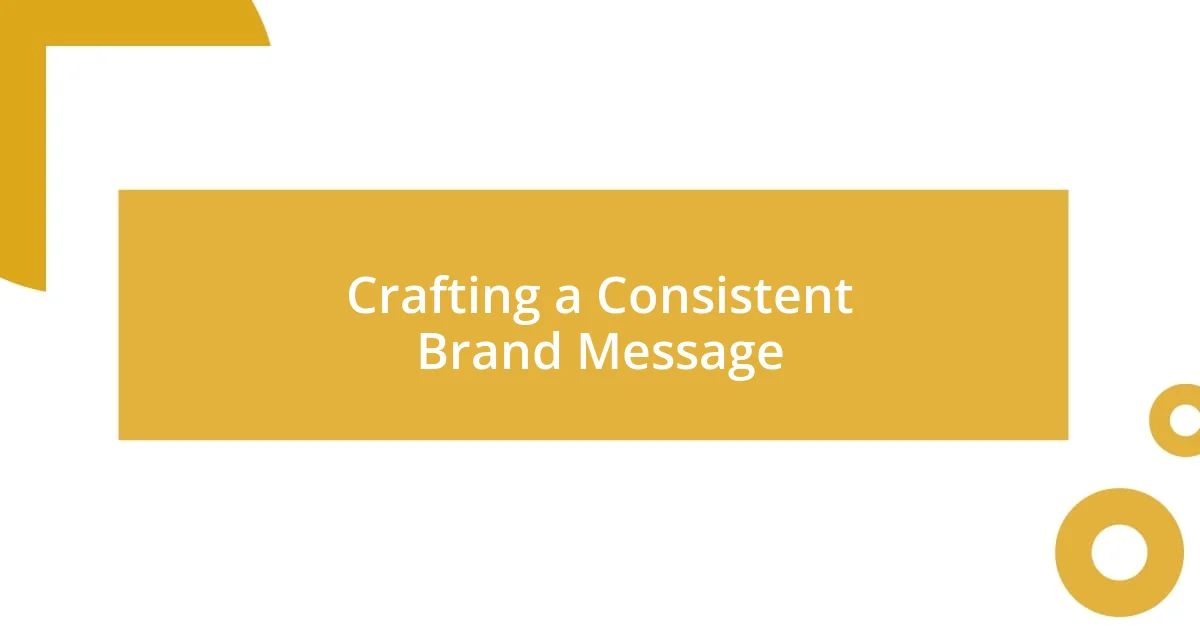
Crafting a Consistent Brand Message
Crafting a consistent brand message is all about aligning every piece of communication with your core values and essential themes. I remember when I first tried to communicate my brand message; it felt like juggling too many balls in the air. I often asked myself, “What do I want people to remember about me?” I realized that repeating my key messages regularly helped solidify my brand in the minds of my audience, creating a memorable identity.
Consistency in messaging builds trust. A few years ago, I shared testimonials from clients that highlighted specific strengths I aim to project, like reliability and creativity. As those themes appeared repeatedly in both my social media posts and blog, I noticed not just an uptick in engagement, but a genuine recognition of my work. When your audience sees the same consistent traits in everything you present, they start to connect those dots, reinforcing their perception of you. Isn’t it powerful that a cohesive message can create that kind of trust?
It’s also important to evaluate how your message aligns with your actions. For instance, I’ve had opportunities where my commitment to my values was put to the test. I had to decide if I’d compromise for a short-term gain or stick to my principles. I chose the latter, and in doing so, my audience responded positively, affirming my brand. This made me reflect on how our consistent message isn’t just about what we say, but also what we do. How can we expect to build a strong brand if our actions don’t echo our message, right?
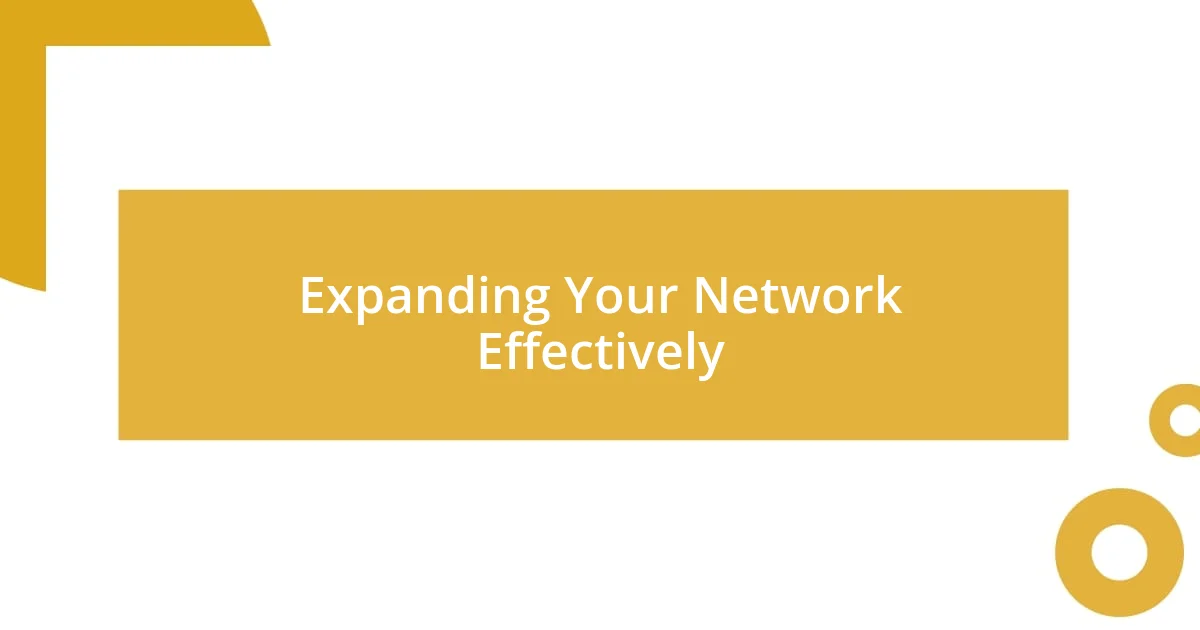
Expanding Your Network Effectively
Expanding your network effectively requires intentionality and authenticity. I remember when I attended a local networking event with the goal of not just collecting business cards, but actually connecting with people. Rather than jumping into surface-level conversations, I focused on asking meaningful questions. It struck me how much deeper those exchanges became. Have you ever noticed how genuine curiosity can transform a brief encounter into a lasting connection?
Reaching out through social media has also been a game changer for me. I used to hesitate, worried my message might come off as too forward, but I found that most people appreciate being acknowledged. When I started sending personalized messages to people I admired in my field, many responded positively and we ended up discussing our shared interests. It makes me wonder—aren’t we all looking for connection, especially in professional settings?
Finally, I’ve learned the importance of follow-up after new connections are made. There was a time when I would meet people and then completely forget to reconnect. However, I now take the time to send a brief message or even a relevant article that sparked my interest. This little effort shows that I value the relationship and it often leads to further conversations. Isn’t that what networking is really about—nurturing professional relationships into something meaningful?

Measuring Your Brand’s Impact
Measuring the impact of your brand is crucial for understanding where you stand and where you can improve. I often use tools like Google Analytics and social media insights to track engagement metrics. It was surprising to discover that a single post could resonate differently across platforms, making me rethink my content strategies. Have you ever wondered why certain posts get more traction than others? It usually boils down to how well they align with your audience’s interests and needs.
Feedback is another powerful measuring stick for your brand’s impact. I still recall the time I solicited feedback after a webinar I hosted. The responses were enlightening, revealing both strengths and areas for growth that I hadn’t initially considered. When I embraced that feedback, my confidence in evolving my brand increased significantly. It’s essential to ask yourself—are you truly listening to your audience, or are you just waiting for applause?
Most importantly, I’ve learned to consider how my brand’s impact aligns with my personal and professional growth. I vividly remember a networking event where multiple people mentioned my unique style of storytelling. Hearing that feedback made me realize I was not just building a brand; I was creating a legacy of authenticity. So, how can we leverage that kind of input to refine our brand further? For me, it’s about continual growth and authenticity—always striving to be better while remaining true to myself.










